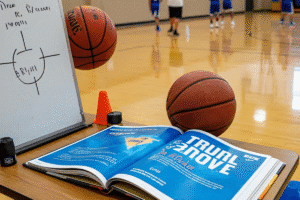The bonus rule in basketball plays a huge role in how games are played, especially in tight situations. It affects scoring, defense, and coaching decisions. In this article, you’ll learn exactly what the bonus is, when it applies, how it differs by league, and how teams can use it to their advantage—or avoid letting it hurt them.
2. What is the Bonus in Basketball?
The bonus is a rule that gives a team free throws once their opponent commits a set number of fouls in a period. This rule helps discourage excessive fouling and keeps the game moving.
What Does Bonus Mean in Basketball?
It means that a team is rewarded with free throws when the other team commits too many fouls during a quarter or half, depending on the league.
What Does “Bonus” Mean in Basketball?
Simply put, when your team is in the bonus, any defensive foul against you means free throws—even if the foul wasn’t during a shot.
Bonus in Basketball: Basic Information Explained
Though the details vary slightly across leagues, the main idea stays the same: the bonus exists to penalize frequent fouling and reward clean play.
The Bonus Foul Rule in Basketball Explained (and its Implications)
This rule changes how teams play. On offense, players try to draw fouls. On defense, players become more cautious to avoid giving away easy points.
Understanding the Bonus Foul Rule
It’s a rule that encourages fairness. If a team keeps fouling, the other team gets free shots. This pushes teams to play smarter.
Common Misconceptions
A common misunderstanding is that all fouls lead to free throws. That’s not true. Only after a team reaches the foul limit do non-shooting fouls trigger bonus free throws. Also, offensive fouls usually don’t count toward the bonus.
3. When Does the Bonus Occur?
The bonus starts once a team reaches the foul limit set by the league’s rules.
What Are the Primary Conditions That Initiate the Bonus or Penalty Situation?
Each league sets its own number. Once a team hits that number, the opposing team gets free throws for every defensive foul.
How the Bonus is Called
Referees keep track of team fouls. When the number hits the limit, the bonus starts. The scoreboard shows when a team is in the bonus.
Can Both Teams Be in Bonus?
Yes. Both teams can be in the bonus at the same time. This often happens late in close games.
The Implications of the Bonus on Gameplay
Once a team is in the bonus, they may drive to the basket more to draw fouls. On defense, players must avoid risky moves that could lead to free throws.
4. Bonus Rules by League
Here’s how the bonus rule works in different basketball leagues.
NBA / WNBA / FIBA
- Fifth Team Foul in a Quarter: After five fouls in one quarter, the other team enters the bonus.
- Fourth Team Foul in Any Overtime Period: In overtime, it only takes four fouls.
- After the Foul to Give During the Last Two Minutes: Teams often save a foul to give in the final two minutes. Once used, any foul gives away free throws.

League Bonus Rules
NCAA Men’s College Basketball
- Seventh Team Foul in a Half: This triggers the “one-and-one.” The player must make the first free throw to get a second.
NCAA Women’s & High School (NFHS)
- Fifth Team Foul in a Quarter: After five fouls, the other team gets two free throws every time.
Men’s College Basketball
Once the tenth team foul happens in a half, teams shoot two free throws every time.
Women’s College Basketball and High School
Just like before, five fouls in a quarter lead to two free throws.
Professional Basketball
The NBA, WNBA, and FIBA use a four- or five-foul rule per quarter to decide when the bonus begins.
5. How to Use the Bonus to Your Advantage
Teams can turn the bonus into an opportunity to score more points.
Attack the Basket
Driving toward the hoop makes it easier to draw fouls and earn free throws.
Keep the Ball With Your Best Shooters
Give the ball to players who are good at free throws. This improves your chances of scoring.
Practice Free Throws
The bonus won’t help if you miss at the line. Teams should spend regular time practicing free throws.
6. Preventing Your Opponent From Using the Bonus
Smart defense can stop the other team from taking advantage of the bonus.
Practice How NOT to Foul
Teach players to move their feet, stay in position, and avoid reaching in.
Play a Zone Defense
Zone defenses help reduce individual fouls by spreading responsibilities across players.
Eliminate Silly Fouls
Stay calm and focused. Avoid emotional or unnecessary fouls that give away free points.
7. How to Be Strategic on Defense During the Bonus
How Can I Be Strategic if I am on Defense During the Bonus?
Be extra careful. Don’t gamble on steals. Stay between your player and the basket. Use strong communication and focus on clean, disciplined defense.
8. Conclusion
The bonus rule isn’t just a small detail—it’s a game-changer. By understanding when it applies and how to play during bonus situations, teams can avoid giving away points and even win close games. Whether you’re attacking or defending, smart play during the bonus can make all the difference.







